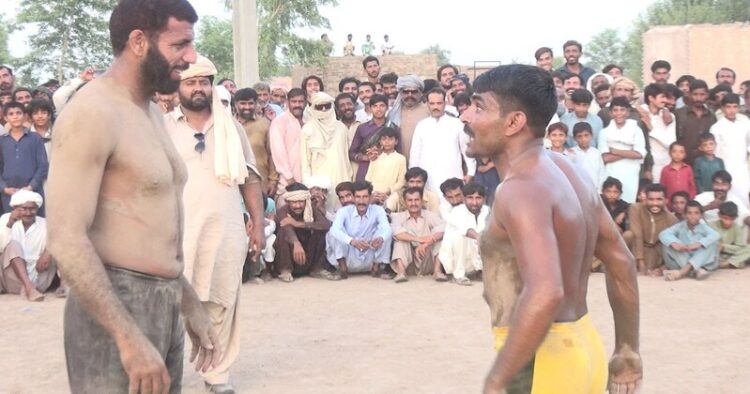Pakistan, a country founded on the ideals of religious unity, continues to grapple with the deeply ingrained issues that affect its social structure. Recent events in Punjab (Pakistan) showed the lasting impact of caste divisions within the Muslim community. This highlights a reality often overshadowed by the country’s bigger story of national identity. The incident, happening in sports, serves as a clear reminder of the deeply rooted caste systems that linger in Pakistan. Javed Jatto, superstar of Kabaddi and record-breaker in domestic leagues, found himself in the spotlight. Not for skill on the field, but for a choice echoing far beyond the playing area.
Pakistani media is reporting the story of Islamic Kabaddi player Javed Jato fighting against opponents from the Sayyid caste, the heart of Pakistani society. But instead of joining the clash of skill and attack, Jato, recognising the character of his opponent, accepted a good victory without competition. 1783495055044403605
Non-Muslims are considered inferior to Muslims, Pasmanda are deemed lower than Syed, and Syed are considered inferior to Arabs, and so forth.
There is no concept of equality among humans in Islamic Pakistan.pic.twitter.com/roeNvb1imt
— Pakistan Untold (@pakistan_untold) April 25, 2024
This respect, although ostensibly limited to the field of sports, reflects the reality of the relationship between social status and privilege in Pakistani society. Although the country remains committed to the principles of equality and religious unity, conflicts continue to impact interactions and opportunities for millions of people across the country. It is an important issue. His grandchildren are Hz. The Sayyid caste, dating back to Muhammad, has a high and influential status in Pakistani society.
Although actual demographic data on ethnic minorities in Pakistan is limited due to the importance of the issue, estimates suggest that Sayyids are part of the population and have a correct and politically significant influence on society. Besides the Sayyid caste, Pakistan is also home to many tribes, each with their own culture and cultural significance. From the Araans, traditionally associated with agriculture, to the Rajputs, known for their military roots, the people of Pakistan love this region, which shows a history of migration, conquest and social stratification. The following events related to Javed jato have an impact on the interaction of caste, religion and culture in Pakistan.
Despite the country’s efforts to protect the right to equality and justice in law, reality often reveals a different narrative; a sign of a deep and unequal divide. It constitutes approximately 1.2% of the total population. A large number of these minorities belong to the Scheduled Castes, illustrating the long-term effects of inequality within and among minorities. There are approximately 40 different tribes in the geography of Pakistan, and 32 of them were recognized by the presidential decree in November 1957. Historical dominance. The persistence of ethnic identity despite the existence of laws for equality and protection demonstrates the interplay of religion, ethnicity and culture in Pakistani society.
An example of one person is Kaneria, a former Hindu cricketer who represented the Pakistan national cricket team. Despite Kaneria’s talent and contribution to the sport, he faced discrimination and controversy due to his Hindu beliefs. Although Kaneria is one of the most successful cricketers in Pakistan cricket history, he faced challenges in his career, including being overlooked for his captaincy role and facing hostility from his colleagues and superiors.
https://twitter.com/TimesNow /status/1717539939506704387
Kaneria’s experience shows the seriousness of religious beliefs in Pakistan, even in respected areas such as sports. Despite his achievements on the field, his Hindu identity prevented him from being fully recognised and accepted by the Pakistani cricket community. Their articles highlight the broader issues of religious favouritism and discrimination faced by minorities in Pakistan, affecting their advancement and inclusion in all aspects of society.
Problems rooted in history, social and political dynamics. Since its independence in 1947, Pakistan has grappled with the challenge of building a unified country while maintaining its diversity. India is characterised by significant social problems. Despite efforts to eliminate ethnic differences, especially through Islamic teachings, racial discrimination continued in Pakistan after partition. The migration of millions of people from India to Pakistan during Partition deepened these divisions as communities sought to preserve their culture and traditions in their new countries. Families and other upper caste groups have historically been very influential and influential in society. This type of preference manifests itself in many areas, from politics to business to education. Politicians often target specific groups of people to get votes, which leads to the influence of the poor and creates conflict.
The country was created as a country for Muslims, and this led to conflict and hatred between minorities such as Hindus and Christians. State policies such as swearing and racial discrimination increase discrimination and create an environment of distrust. While some communities, especially those with a higher or Muslim majority, have better access to resources, opportunities and jobs, other groups are believed to face problems affecting the growth of the economy. Although the constitution guarantees equality and non-discrimination, racism and religious discrimination still exist in Pakistan; often under the influence of cultural norms, cultural and political interests. Addressing these deep-rooted inequalities requires states and communities to work together to promote inclusion, social justice and equality for all citizens, regardless of household or religion.




















Comments